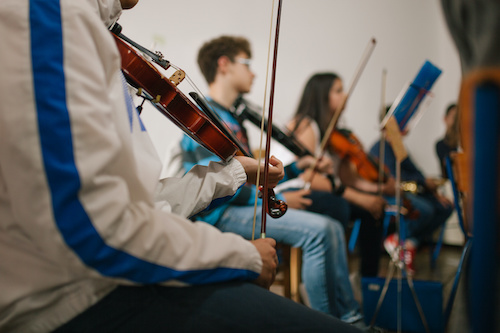Key factors:
At its core, music is about self-expression and creativity. Music training additionally offers college students an opportunity to mirror on their interior ideas and helps struggling youngsters construct their confidence in a secure area.
When used appropriately, music may even uplift total communities and assist people overcome hardships. Inspirational scores make an actual distinction to people who’re down on their luck and lonely college students can bond round a shared love of music.
A sturdy musical training goes past the partitions of the classroom, too. Musical applications can accomplice with group teams to convey pleasure and success to people who reside within the space. All these applications will help college students acquire expertise as volunteers and foster a way of social duty in schoolchildren.
The worth of musical training
Immediately, solely 10.1 % of younger adults can play a musical instrument. This exposes a serious flaw in our present training system. Having the ability to play an instrument will increase the mind’s neuroplasticity, reduces stress, and improves reminiscence and coordination. Of us who take part in musical training profit from improved listening and studying abilities, too.
This sentiment is echoed by Nina Kraus, professor of communication sciences, neurobiology and physiology at Northwestern College. Kraus explains that enjoying music provides “an infinite capability for enchancment,” as nice musicians know that they will all the time attempt for “higher nuance, defter method, and higher synchrony with their ensemble.”
This type of sturdy apply triggers broader cognitive and sensory adjustments inside college students. Of us who’ve a musical training are capable of course of delicate acoustic variations. This offers college students a head begin when making an attempt to be taught a brand new language.
However the advantages don’t cease there. Kraus continues to elucidate that musical training has intangible advantages like improved focus and self-discipline, elevated social engagement, and deeper friendships which were fashioned whereas rehearsing with pals. These advantages will be supercharged when going past the classroom, as college students will likely be uncovered to a higher vary of individuals with a bunch of various backgrounds and insights.
Music and management
Most individuals affiliate scholastic management with scholar presidents, peer mentoring, or captaining a sports activities membership. Nonetheless, music offers the proper area for would-be scholar leaders to apply their potential to work with a workforce and information their friends towards higher performances.
This method is championed by Crystal Hernandez, who sees the varsity system as synonymous with an orchestra. As a musician, Hernandez gained important management abilities whereas studying to meld with the bigger symphony. This type of expertise serves her effectively as a principal, the place she makes use of her musical expertise to make sure that her followers are all buzzing alongside to the identical tune.
College students who’ve the chance to mentor budding musicians outdoors of the varsity system acquire hands-on expertise with group engagement, too. That is pivotal if you wish to run the form of instructional program that produces civic minded, socially accountable college students.
Connecting with the broader musical group is simpler as we speak than ever earlier than. That is largely because of the laborious work of organizations like The Nationwide Affiliation for Music Training, which places learners in touch with group music teams.
Working with NAME will help your college tackle vital issues associated to musical training and group engagement. NAME addresses issues that proficient musicians are put in contact with music teams in an equitable, honest manner. This doesn’t simply enhance the synchrony of the symphony; it ensures that college students are given entry to a various vary of experiences when working with community-based musical teams.
That stated, community-based musical alternatives require critical buy-in from college students, educators, and group leaders alike. Rising buy-in improves creativity by encouraging people to take dangers and push their boundaries when working collectively on a musical rating. Honest buy-in from all stakeholders additionally helps stability out the strengths and weaknesses of a musical group that means all individuals are put able to succeed.
Musical applications don’t need to function giant ensembles and orchestral scores, both. Group-based musical applications like Mallet Insanity train children the way to play xylophones, glockenspiels, marimbas, and metallophones whereas constructing developmental abilities.
Working with the broader musical group may give college students a greater understanding of social duty, too. College students can leverage their entry to on-line music training instruments to assist mentor would-be musicians and lift the general normal of the group. That is empowering for college students and group musicians alike, as each profit from scholar buy-in.
Equally, college students who interact with group bands are nearly sure to enhance their abilities. This type of equitable trade of expertise teaches college students the worth of group outreach and exhibits younger musicians that they will all the time discover assist to refine their abilities.
Conclusion
A sturdy musical training goes past the classroom and teaches learners that they will use their musical abilities to attach with their group. Group-based applications, like NAFME, assist unfold the expertise in your college equitably round completely different music teams, too. This ensures that each scholar has entry to a gaggle that fits their ability degree and authentically advantages from their presence.


